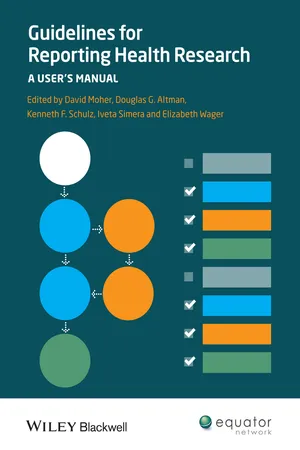
Guidelines for Reporting Health Research
A User's Manual
- English
- ePUB (mobile friendly)
- Available on iOS & Android
Guidelines for Reporting Health Research
A User's Manual
About this book
Guidelines for Reporting Health Research is a practical guide to choosing and correctly applying the appropriate guidelines when reporting health research to ensure clear, transparent, and useful reports.
This new title begins with an introduction to reporting guidelines and an overview of the importance of transparent reporting, the characteristics of good guidelines, and how to use reporting guidelines effectively in reporting health research. This hands-on manual also describes over a dozen internationally recognised published guidelines such as CONSORT, STROBE, PRISMA and STARD in a clear and easy to understand format. It aims to help researchers choose and use the correct guidelines for reporting their research, and to produce more completely and transparently reported papers which will help to ensure reports are more useful and are not misleading.
Written by the authors of health research reporting guidelines, in association with the EQUATOR (Enhancing the QUAlity and Transparency Of health Research) Network, Guidelines for Reporting Health Research is a helpful guide to producing publishable research. It will be a valuable resource for researchers in their role as authors and also an important reference for editors and peer reviewers.
Frequently asked questions
- Essential is ideal for learners and professionals who enjoy exploring a wide range of subjects. Access the Essential Library with 800,000+ trusted titles and best-sellers across business, personal growth, and the humanities. Includes unlimited reading time and Standard Read Aloud voice.
- Complete: Perfect for advanced learners and researchers needing full, unrestricted access. Unlock 1.4M+ books across hundreds of subjects, including academic and specialized titles. The Complete Plan also includes advanced features like Premium Read Aloud and Research Assistant.
Please note we cannot support devices running on iOS 13 and Android 7 or earlier. Learn more about using the app.
Information
Part I
General Issues
Chapter 1
Importance of Transparent Reporting of Health Research
“Reporting research is as important a part of a study as its design or analysis.” [1]
“Poorly conducted trials are a waste of time, effort, and money. The most dangerous risk associated with poor-quality reporting is an overestimate of the advantages of a given treatment … Whatever the outcome of a study, it is really hard for the average reader to interpret and verify the reliability of a poorly reported RCT. In turn, this problem could result in changes in clinical practice that are based on false evidence and that may harm patients. The only way to avoid this risk and to be sure that the final message of a RCT can be correctly interpreted is to fulfill the items listed in the CONSORT statement.” [2]
Introduction
Box 1.1 Examples of poor reporting highlighted in systematic reviews
Table of contents
- Cover
- Title Page
- Copyright
- List of Contributors
- Foreword: Guides to guidelines
- Preface
- Part I: General Issues
- Part II: Specific Reporting Guidelines
- Part III
- Part IV
- Index
- End User License Agreement